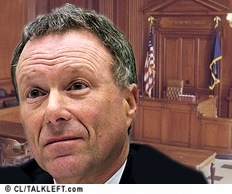Libby's trial was never about whether the Administration ginned up excuses to go to war in Iraq. At this point in time, most rational people know it did. The trial was never about whether Libby outed CIA agent Valerie Plame Wilson to Robert Novak. That may have been the genesis of the criminal investigation but we knew months before the trial began that former Secretary of State Richard Armitage was the careless leaker, not Libby.
This trial has been about whether Scooter Libby lied to FBI agents and the grand jury and thereby obstructed justice. That being said, I think Team Libby made a serious mis-step in the beginning. Whether they can recover now is anyone's guess. They should have learned from the memory experts in eyewitness misidentification cases -- the eyewitness is not lying, he's simply mistaken. Team Libby should not have gone out on a limb in opening argument and claimed the Administration threw Libby under the bus to save Karl Rove. It shouldn't have argued that Tim Russert was biased against Libby. They didn't establish either one.
All Team Libby had to do was bring out each witness' memory lapses -- every fact witness had them -- and then argue Scooter had them too. Memory is fallible and imperfect. Scooter, like Miller, Cooper, Grossman, Fleischer and Russert, all of whose testimony included an "I don't recall" at some point, was mistaken, not lying.
If Libby were simply mistaken, he did not knowingly or intentionally lie and his mistaken recollections did not obstruct justice. And, if the jury isn't sure whether he lied, even if they think he might have, that's not enough for conviction. It's a reasonable doubt.
Can the jury really be sure, "beyond a reasonable doubt" kind of sure, that Miller, who forgot having an in-person meeting with Libby -- their first one -- on June 23, until she found a notebook in a shopping bag under her desk; that Cooper, whose note-taking was filled with incomplete sentences and who consistently typed the wrong characters and suggested his current recollection is more reliable than his dubious notes and who forgot to include his most damning statement about Libby in his initial e-mail to Time; that Ari Fleischer, who failed to correctly identify Walter Pincus as a reporter for whom he may have been a source about Valerie Plame Wilson and her purported role in sending Joseph Wilson to Niger; and that Tim Russert who once apologized in a letter to the editor of a Buffalo newspaper for being wrong about his recollection about a conversation, are correct in their memories while Libby was not only wrong but lying in his recollection?
Viewing the case through that lens, I see reasonable doubt. There's just one hanging thread. It's that Libby told the grand jury when he spoke to Matthew Cooper on July 12, he didn't even know Joseph Wilson had a wife (pdf).
a. Testimony Given on or about March 5, 2004 Regarding a Conversation With Matthew Cooper on or About July 12, 2003:
Q. And it's your specific recollection that when you told Cooper about Wilson's wife working at the CIA, you attributed that fact to what reporters -
A. Yes.
Q. - plural, were saying. Correct?
A. I was very clear to say reporters are telling us that because in my mind I still didn't know it as a fact. I thought I was - all I had was this information that was coming in from the reporters.
. . . .
Q. And at the same time you have a specific recollection of telling him, you don't know whether it's true or not, you're just telling him what reporters are saying?
A. Yes, that's correct, sir. And I said, reporters are telling us that, I don't know if it's true. I was careful about that because among other things, I wanted to be clear I didn't know Mr. Wilson. I don't know - I think I said, I don't know if he has a wife, but this is what we're hearing.
To me, that's the mojo Ted Wells and Bill Jeffress need to work in Libby's closing. If they can get past that statement and drop their unproven claim of "I was left out to dry to save Karl Rove" from their closing argument and rise above trying to cast Libby as a victim, they have a chance.
No one on this jury is going to buy Libby as victim, although they may conclude he was no more mistaken than any other witness. Once the jurors try to figure out motive, even though it's not a necessary element of the charged crimes, I call a draw. Fitz just didn't establish motive beyond a reasonable doubt.
Now, let's get to the real issue making many of you despondent: Karl Rove walked. The only solace I can offer is this: Richard Armitage got the same result on his own, without a lawyer. Hopefully, Rove will be in debt to Robert Luskin for years to come.
As to not calling Cheney as a witness, I don't read too much into it except this: Libby reportedly forked over $3 mil plus for his defense. That allowed enough money for focus groups. I wouldn't be surprised if the focus groups found Cheney to be such a polarizing figure that Team Libby concluded that any good Cheney would do for Libby on substance would be completely overtaken by the jury's loathing for him personally. If that's the case, while Libby may walk, the country has won.




